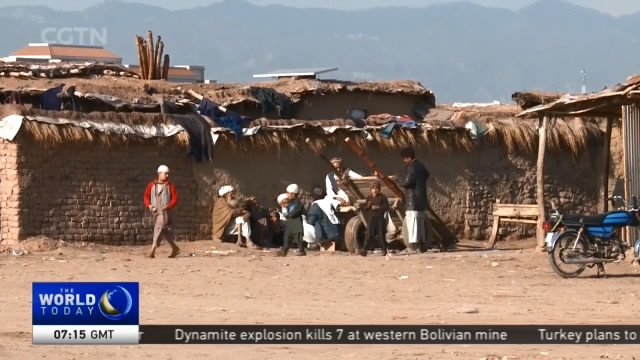
16:01, 12-Apr-2018
Afghan Refugees in Pakistan: Dual pressure on Islamabad

Pakistan hosts millions of Afghan refugees, and has been experiencing many social problems as a result. Local experts say the refugees burden the economy and challenge national security. CGTN's Zhu Xuesong reports from Peshawar.
The Afghan refugees' issue has been lingering for decades. One key date is the September 11th attacks on the US, after which a multitude of refugees had to leave their war-torn home-country for Pakistan. The border between Pakistan and Afghanistan is long but not heavily guarded. Thus, Afghan refugees could cross easily. Following appeals from UNHCR and other NGOs, Pakistan accepted most of the refugees. However, international assistance has been dropping in recent years, which forces Pakistan to shoulder the burden by itself.
JAN ACHAKZAI ADVISOR FOR PAKISTAN'S GOVERNMENT ON KPK PROVINCE "Because every country has its own system, now they depend on jobs, on the local economy, on housing, on health, which are not indefinite, but definite. These resources are over-stretched. No state can provide extra resources just because somebody has been in the country and getting things for free for the last few decades. Now it wants to leave that position."
ZHU XUESONG PESHAWAR, PAKISTAN "Compared with economic issues, the national security problem caused by hosting so many Afghan refugees seems more pressing. Pakistan's government believes there is a high possibility of terrorists swarming into Pakistan, mingling with the Afghan refugees -- and posing a threat to national security."
JAN ACHAKZAI ADVISOR FOR PAKISTAN'S GOVERNMENT ON KPK PROVINCE "We cannot seal the border a hundred percent. The fencing is just one step in trying to improve security on the border. The second is that all the Afghan refugees and all the camps are where we suspect that they can be part of the problem in sheltering some suspects. It is very important that they are sent back. So that is one part of Pakistan's national security concerns."

SITEMAP
Copyright © 2018 CGTN. Beijing ICP prepared NO.16065310-3
Copyright © 2018 CGTN. Beijing ICP prepared NO.16065310-3